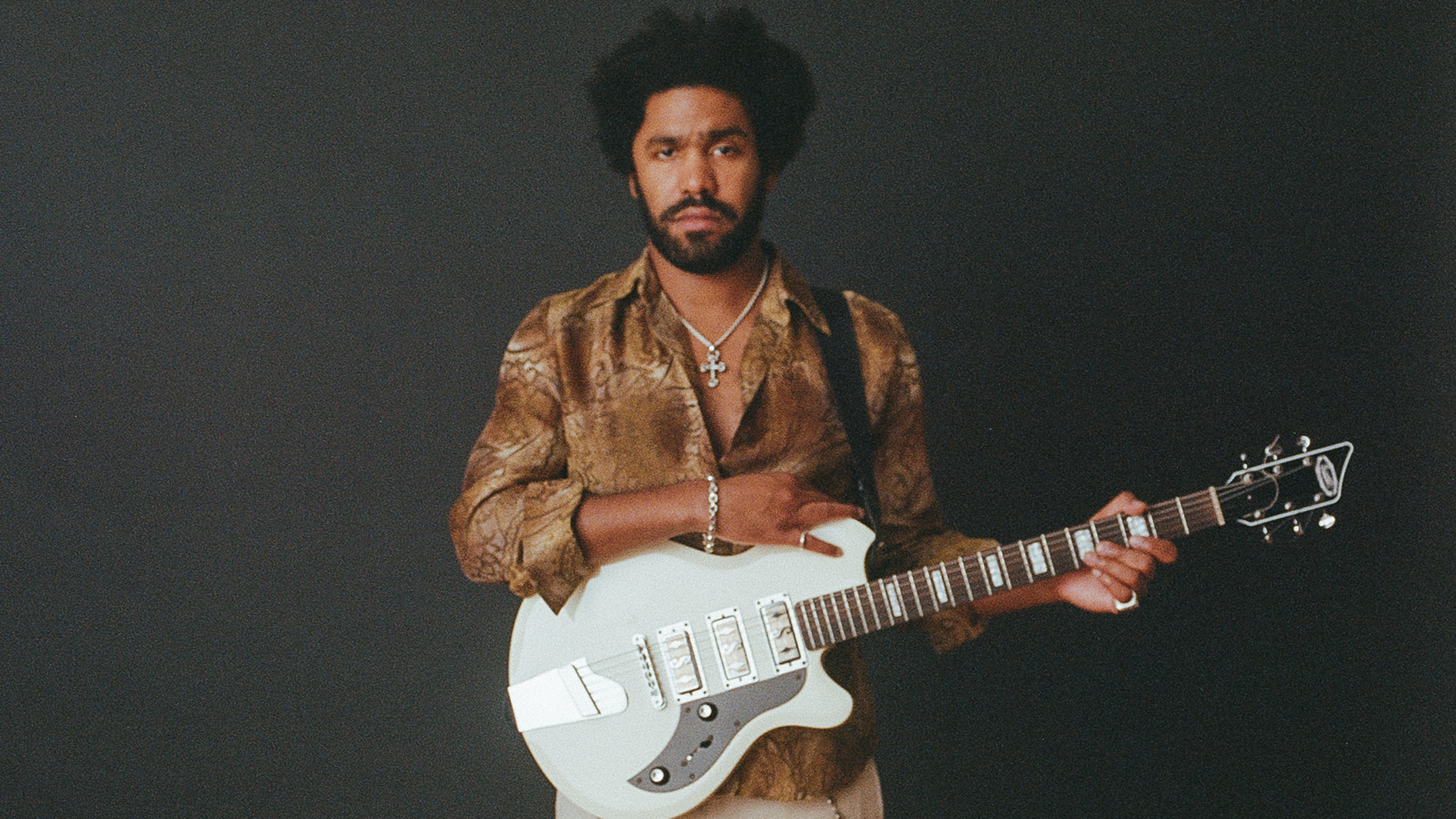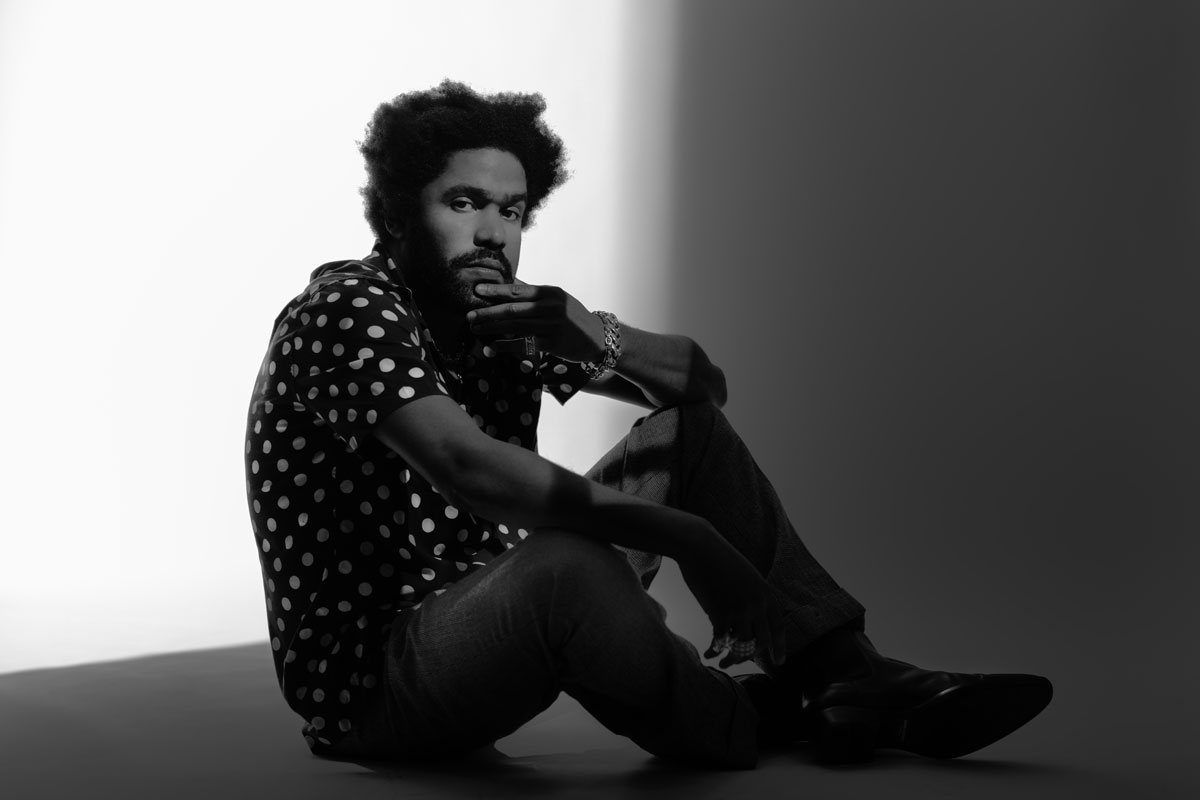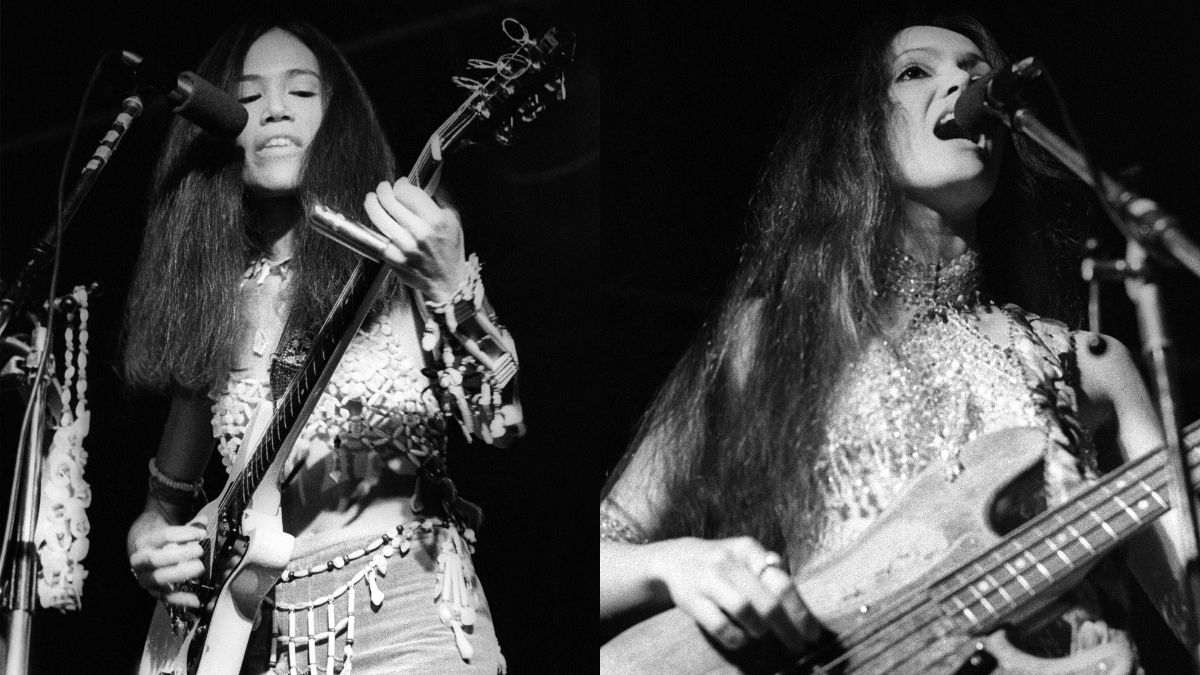Tash Neal: “After my accident, I was playing guitar like every day was my last”
The former London Souls man's solo debut was forged in the face of some deeply challenging circumstances. The guitar was his way back

All the latest guitar news, interviews, lessons, reviews, deals and more, direct to your inbox!
You are now subscribed
Your newsletter sign-up was successful
We’ve all experienced some adversity this past year, but Tash Neal has viewed it from a place of hard-won perspective. The guitarist – best known, until recently, as the frontman of New York rock duo the London Souls – was hit by drag racers in New York City back in 2012 and left in a coma, with a section of his skull missing.
Having clawed back his health, Neal lost his father (a musician and huge inspiration) to cancer just three months later. He has spent the following years channeling his experiences into his powerful debut solo record Charge It To The Game – and, pandemic or not, the gloves are coming off.
The sound, shaped in places by Dan Auerbach, wears the influence and struggles of Neal’s black heroes on its sleeve, sounding in places like Sly and the Family Stone have drafted in Tom Morello.
It’s angry, deeply personal and packed with heavy groove, yet like Neal himself, still full of clarity, wit and idiosyncratic charm. We spoke to Neal about the life-changing experiences and musical evolution behind Charge It To The Game, arguing with his instruments and why you won’t find him hiding behind a “cookie-cutter” guitar…
You have previously discussed how the car accident in 2012 left you in a different place, physically and mentally. Why did it feel appropriate to move from The London Souls to going solo?
“Me and Chris [St. Hilaire] had a long conversation about it and both felt very similar about the work we were making at the time. He had this beautiful collection, which were his tunes. Then I had these songs that were about the accident.
“So All I See Is Blood was about seeing blood because my brain was literally being crushed by blood. I could write an angry riff about it and it kind of made sense. Then Finding My Way, I was in this car accident and in a coma and then a month after I got out of hospital my father was diagnosed with terminal cancer and he died within eight months. So that song was to get me through that.
All the latest guitar news, interviews, lessons, reviews, deals and more, direct to your inbox!
“A lot of it is written through the guitar trying to express things, so the All I See Is Blood guitar solo is really me like screaming out.
“For Bye Bye Bones, in the solo, I've got this kind of George Harrison-type slide guitar and that solo is sort of about me coming out of the coma and it's like a thank you note to everybody who was kind and sent me a lot of love. It was so personal that it made a lot of sense that this would be the solo album.”
We don't always know what a song is about when it starts. When did it become apparent to you that you were writing songs about these experiences?
“When I was writing Boomerang. It was at my friend's house. He was doing something and I started playing this riff and it all came together, this stream. But it wasn’t until a couple of weeks later it dawned on me that it was about this tug-of-war, about getting trying to get back to life.
“I had to live three months without [a part of] my skull, so I couldn't perform and a lot of that time was just learning how to walk again and being in a lot of pain.
“But then after that, I got a plate put in to replace the half of the skull that was taken out and I could get back to shows and there was this kind of intense, not euphoria, but you're so happy to be alive because you just survived something so close.
Had I not gone through the accident and been through that pain, it would have been harder for me to deal with my father's death
“So I was not living fast, but kind of wild! I remember we were touring with Black Crowes in the winter of 2013 and right before with North Mississippi Allstars on a winter tour and I was terrified. I thought I was going to die and my life was consumed by that.
“I was being creative in the shows, I felt on fire, like I was really playing like every day was my last, but also living that way, too! So by the time I could write more, I'd evened out and it was cathartic and it became clear it was about this accident and that recovery process and watching someone you love pass away. I knew that, because I felt better.”
I was really sorry to hear about the loss of your father so soon after your recovery. These huge, life-changing events always seem to come in twos or threes. It would have been easy to fall into a self-destructive place at that point.
“Exactly. That's why I think touring and music saved my life in a way. I don't know how I would have dealt with it otherwise. I'm very close with my parents, they're the reason I'm doing music and I have this passion.
“But had I not gone through the accident and been through that pain, it would have been harder for me to deal with his death, if that makes sense? It gave me such a gratitude for life that I couldn't go to too dark a place when he passed away.
“Also, playing with my friends, with the North Mississippi Allstars and Tedeschi Trucks Band and the Black Crowes, everybody was so sweet and kind that all of that loving energy counterbalanced the negative reality.

“The grief creeps in, though, sometimes you don't know how. It’s there on a song like Something Ain't Right, which was grief in a different way. It was about watching Philando Castile get murdered by the police in 2016, but it found its way in among this grief and dealing with my dad.”
There's a line in Something Ain’t Right: “You say it’s all the same for everyone,” which feels very evocative of the minimizing denial behind the 'all lives matter' defense. Was that an intentional reference?
“Yes. I definitely wanted to be direct in discussing the situation. It was all tied together. Now, people are talking this year about the systemic realities of racism in everything: where we live, how we eat, where we go to school.
“The annoying thing, the cruelest thing is to do something and gaslight the person about it. So they said that ‘all lives matter’, they even said that 'blue lives matter' – until they beat the police with the flag.
“So the cognitive dissonance has become sickening, especially if you're black. The first instinct is to not talk about it because everyone feels uncomfortable and it seems insurmountable but sadly I know that we're going to see another black person get murdered on television by a cop and the song will be relevant again… Until we confront it.”
We felt like family off the bat, just four black dudes making music and doing this rock 'n' roll
I can't think of a slick way to link this back to my next question, but tell me about your band...
“Well it kind of does go to what we're talking about. Years ago, after Philando Castile was murdered, I realized I was going to start this solo thing, but I didn't know what it was going to look like yet.
“So, this is how fate works, I guess, but I get a call and my buddy Danny Clinch, the photographer, is having a jam session at his studio in Jersey. I go and see this dude and me and them are the only black people there. He was playing keys and I was so moved.
“This guy was unbelievable and we started playing together at the jam and we both looked at each other like, 'What is going on?' Afterwards, we start talking, his name was Matt [Godfrey].
“I sent him the record, the album, and he was like, 'Yo this is great. We love this!' I was like, 'Who's we!?' [laughs] He said, 'Well, I've got two brothers [Jordan and Dave Godfrey]…’ We felt like family off the bat, just four black dudes making music and doing this rock 'n' roll.
“They have a great band called MJT and we just hit it off, coming from the same place and understanding what these songs are about.”
I know you worked with Dan Auerbach on a few songs for the record, including Like A Glove. How did it all come together?
“We'd met The Black Keys years before when Brothers was just about to come out. This was back when we were chilling in New York, in my early 20s. They were great. They came to a show of ours in Brooklyn and I saw Dan Auerbach in the audience, but then we hadn't seen each other in years.
“He was great to work with. His studio's dope and he's got a really interesting mind, he's a really creative dude with sounds and sonics. The rest of the album was a couple of years in the making, though.
“The mixing process took a while. I really wanted to make it as black as possible. I didn't want to dumb anything down. A lot of times certain people would be like, 'We want that bass down...' Or 'The drums are too loud!' But it was like, 'Relax! It has to be like this.’”
What have you noticed about the way your playing has evolved in recent years?
“I think on this album things became a little bit more expressive in my solos, whereas the first 'Souls album was very much a live album. Those early shows were just: 'Waaaaa!' That, to me, sounds tense now, like I'm holding my breath.
There's a solo at the end of Just A Little Bit that I'm super-proud of in terms of the heaviness and getting the guitars together on that
“Whereas some of these I'm kind of breathing through the solo – not in a bad way, it's not slow, I've kept my right hand speed together. There's a solo at the end of Just A Little Bit that I'm super-proud of in terms of the heaviness and getting the guitars together on that. The way I'm arranging things now is completely different, certainly than before 2016.”
What was the thinking behind your gear in these sessions? Did you use your FrankenTele?
“For the album, I did do some Tele stuff. If I'm doing something funky, or want to add a clean guitar. But then a lot of the live basic tracks were my Gibson ES-335, which is my workhorse.
“My prized one is the Rich Robinson model, the first one, and he gave that to me at the end of our tour. He's the reason I play the '335. I saw a picture, probably in Guitar World.
“I didn't know who the Black Crowes were at the time, but I like the way it looked. The TSA broke the neck of that guitar like three times, so now I keep it in a shrine and it's safe!
“But when I record I use this other '335. I've played it so much the pickguard broke off and I've added a Bigsby to it. Then I love playing through a Bassman 100-watt. That's a dream match with a Vox AC30. That's what I play live a lot. I've also just reintroduced a fuzz into my rig, a Big Muff.”
You seem to have a thing for oddballs or customized guitars.
“Yeah, it makes me uncomfortable to have low-key, cookie cutter stuff. The Les Paul I play is a Zoot Suit one! When I got it, nobody wanted it. I went to the showroom and I think it was supposed to be used for the Fela Kuti show on Broadway.
“I walked into the room and I said, 'That is the guitar for me!’ They were like, 'Dude, nobody wants this guitar...' and I said, 'I'm gonna make it work.’ The action was a little off or whatever, but that ain't nothing! It's not gonna stop me, you've gotta work around it and play through that.”
We can be pretty quick, in the guitar community, to iron out the wrinkles in our instruments and that's not always a good thing. I like the sound of that fight.
I hadn't seen a lot of my guitars for a long time and I had a situation recently where my Gibson ‘335 that I play the most was so mad at me!
“Same! It means it's always unique and in the moment and it's honest, right? And that's kind of the point. I'm not travelling too much in the pandemic, so I hadn't seen a lot of my guitars for a long time and I had a situation recently where my Gibson ‘335 that I play the most was so mad at me! I took it out for the Boomerang video and it was like, 'OH! So now you wanna play me? Wow. Good to see you. That's cool...'
“I'm like, 'I'm so sorry! It's the pandemic... it's once in a hundred years!' [laughs] I was kind of nervous about it! I gave it a couple of days off and it finally stopped buzzing on the first fret and I was like, 'OK, thank you. We have an understanding now!’”
You've been through a lot personally over the last decade, do you think it has helped prepare you for coping with this more universally horrendous situation of the past year?
“Yeah, honestly, in everything! That's the album – it's dealing with that dichotomy. My experiences were a huge curse in the pain aspect, but a huge blessing in the perspective aspect. Sure, it is not ideal to be stuck inside due to an airborne deadly virus, you know? [laughs]
“But also I remember being stuck to the hospital bed because I couldn't walk and having to prove that I could think and communicate correctly. I remember those nights in the hospital bed and having to question a lot of heavy existential shit, so to have those moments alone kind of prepares you for anything. Once you've faced death, or been very close, it's like, 'What else are we fearing?'”
Charge It To The Game is out on March 23 via Black Hill Records and available to preorder now.

Matt is Deputy Editor for GuitarWorld.com. Before that he spent 10 years as a freelance music journalist, interviewing artists for the likes of Total Guitar, Guitarist, Guitar World, MusicRadar, NME.com, DJ Mag and Electronic Sound. In 2020, he launched CreativeMoney.co.uk, which aims to share the ideas that make creative lifestyles more sustainable. He plays guitar, but should not be allowed near your delay pedals.
